Interview conducted 13th August, 2019 by Warwick Middleton
Disclaimer: The views expressed in this interview are solely those of the interviewee.
Last Month we ended the interview with Jeff’s decision to publish the previously unpublished letters of Sigmund Freud, letters which indicated his ongoing belief that at least some reports of child abuse were genuine, and not fantasy. In Part 2 Jeff continues with the story of his interactions with Anna Freud, and the long term impact of this decision on his career.
Jeffery Masson: I think that she (Anna Freud) knew that there was something very important, and deep, and real going on here, and that she had ignored it, and her father had ignored it, for a hundred years. Because, when I opened Freud’s desk – I was sitting at his desk working – I opened the top right-hand drawer, and I see a series of about 25 letters. Gee, what are these letters in the top right-hand drawer of Freud’s desk? And it’s as if nobody had ever looked at them, and I looked through them – they were all about child abuse, every single one of them. And it’s as if Freud had a bad conscience, and he had put these letters there, well, I won’t speculate, but to remind him, to be dealt with at some point, to be found by someone else … who knows? I said to Anna Freud, “Look, here are all these letters dealing with child abuse. How can you say that your father wasn’t still concerned about child abuse?” She said, “I don’t know what those letters are. I have not looked at them.” So, all of those letters I put into my book, “The Assault on Truth”.
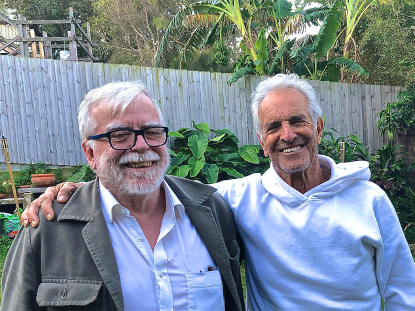
And when I gave my first paper at the Western New England Psychoanalytic Society, I told them about these letters, and they looked at me as if I were mad. They were silent. They were angry. I couldn’t fathom it. I didn’t get it. It’s true that I was saying something disturbing to them. To any analyst who believed that his patients were making up stories about abuse, to be told that Freud really believed them for a long time after he was supposed not to have believed them – I understand that that’s upsetting, but the honest thing to do would be to (investigate it further). But they didn’t do that. They said, “What’s wrong with you?…Why are you interested in this topic?”
I couldn’t fathom it. I said “Who cares what you or I think? We’re supposed to be objective scientists looking at the record. Here are Freud’s letters – 163 new letters, that deal with child abuse. How can you say they’re not important?”
And within days, Eissler called me in a rage. He said, “I am getting so many calls. Analysts are in a panic, their patients are coming in and saying, ‘I told you I was sexually abused, and you said it wasn’t true.’” Because the New York Times picked up on my talk, and they published a two-part series in the New York Times about the reality of child abuse, based on this research I was doing, and, really, the shit hit the fan. All hell broke loose! Eissler was in a rage. He called Anna Freud. Anna Freud was upset. Every analyst in America was upset. Well, they were for a good reason, because it was not a trivial thing. You know, these male analysts had told their patients that child abuse is a fantasy. That didn’t happen to you.’ … (But) they could not get the patient to believe that it never happened. And the women were upset, understandably.
I received many, many letters, especially after the New York Times articles came out. Anyway, I was brought into the Freud Archives, to the 13 male members. There was only one woman present, Lotte Neuman, and I was told, “You’re fired!”
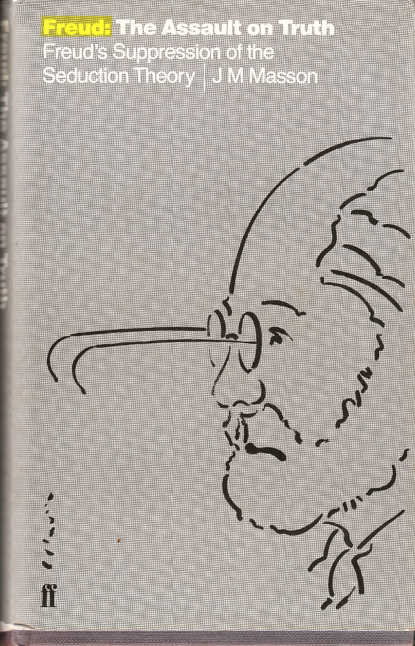
I said, “Wait a minute!” I had just begun my job nine months previously. I’d given up my full professorship of Sanskrit at the University of Toronto. “You can’t fire me. My whole life is now in this research.”
They said, “But, you’re wrong!” My reply was, “If I’m wrong, prove it. Look at the documents. This is what the historical documents tell me. If I’m wrong, look at them and tell me where I went wrong…”
And Eisler was practically in tears. He said, “You were like my son, and you betrayed the family. This is patricide. You’re killing your father, Freud. You’re killing me!”
I said, “A, you’re not my father. B, Freud is not my father. C, this has nothing to do with reality. Look at the historical reality, objectively. We have to examine these documents. If they tell us something that you don’t want to hear, so be it. Change your mind.”
But they said, “No, you’re paranoid! If you believe these women, you cannot represent psychoanalysis. As of today, you are fired from the Freud Archives.”
I was very hurt because I had given up my professorship. I couldn’t get it back. And then within days, my membership with the International Society was rescinded. I was no longer a member of any psychoanalytic society. My best friends, who were psychoanalysts, would literally not talk to me.
Literally nobody – Shengold, Calef, Weinshel – all of these people, close to me, friendly with me, would have anything to do with me. And I was not any different. I was the same person. It was just that I had found documents… I can’t even say “found” – Anna Freud gave them to me, in a very generous spirit, “Here, publish these”, and I did. I still to this day fail to understand why they were so enraged at me, personally.
But slowly the profession re-arranged history: “We psychoanalysts were the first to recognize child abuse. We’ve always been interested in child abuse. We’ve never denied child abuse.” And that is just not true. It’s simply not true. And to this day, no analytic institute ever asked me to come and talk to them to discuss these ideas, to show them the letters, to tell them how I translated them, what I’d found… They really just wished it had never happened. I still remain persona non grata. I am considered a kind of anti-Christ in the church of psychoanalysis.
All I did was reveal these documents. And I still don’t understand to this day, why is that a crime, to look at documents? I tried to avoid interpretation in “The Assault on Truth”. But, in the end, I couldn’t completely avoid saying I believe Freud made a terrible mistake, when he turned away from the reality of abuse and turned toward fantasy. He was condemning these women who had been hurt, who’d been raped, who’d been sexually abused, to a lifetime of suffering. And it led, I wrote, to the sterility of psychiatry and psychoanalysis throughout the world, and I still believe that.
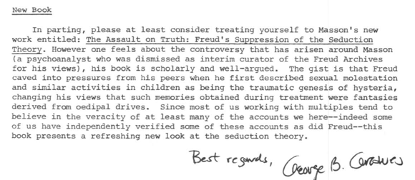
Warwick Middleton: Jeff, one question – given what had happened to Sandor Ferenczi (1873-1933), and to Robert Fliess, when he trod this path, did you have any thoughts that, perhaps, when you went down this direction, that you may encounter something not dissimilar?
Jeffrey Masson: No, stupid me, I did not! I was ignorant. I wasn’t ignorant of the history. Ferenczi wrote what is still the best paper ever written about child abuse – “The Confusion of Tongues between Children and Adults” in 1932, and analysts did everything they could, including his own analysand, Ernest Jones, Freud’s biographer, to discredit him. They turned their back on him, exactly as they did me, but why didn’t I see that coming? Because I wasn’t a prominent analyst the way Ferenczi was. I was really a very junior person, who simply had access to documents, so I didn’t expect it. I didn’t expect to be treated the way Freud was.
At the very, very end of her life, Anna Freud did write a little article, that was very strange. I haven’t done a lot of research on it. It would make a fascinating study. She did write just a line saying sexual abuse is the worst thing that can happen to a child, and it is real. I like to think that that had something to do with our discussions, but I don’t know enough about it. She died shortly thereafter. And Elisabeth Young-Bruehl (1946-2011), who was an awful woman, a psychoanalyst, wrote her biography, and blamed me for her death. Now, that’s absurd. I mean, it’s true that she was very upset with everything that was taking place, but she never accused me of anything beyond holding the wrong views. She did believe that child abuse was not real; and then, suddenly, just before she died, she said, actually, it is real.
You know the mystery is… Anna Freud published this book in 1954, “The Origins of Psychoanalysis”, containing the letters between Freud and Fliess, and then I published with Harvard University Press in 1985, “The Complete Letters”, and put back the 163 letters she took out, with very little commentary. I didn’t push my views in there. I didn’t have to. Here are the letters, make up your own mind. But analysts have literally said, “We prefer the earlier edition.” “What do you mean, you prefer the earlier edition? That you prefer a bowdlerized edition, that is missing 163 letters?” “Yes, we like it better.”
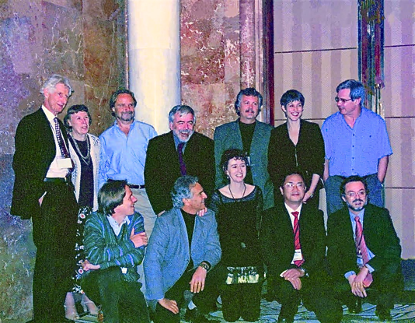
Back row: Russell Mears, Marlene Hunter, John Briere, Warwick Middleton, Colin Ross, Naomi Halpern, John Read.
Front Row: Ellert Nijenhuis, Jeff Masson, Susan Henry, Yuichi Hattori, Vedat Sar
The reason they like it better, is because it confirms their view that abuse is unreal, because there is a famous letter, Letter Number 69, of the Freud-Fliess letters, where Freud said, “I no longer believe my patients when they say they were abused.” Well, that was a very powerful letter. I agree. But Anna Freud left out the letter that came a year later, which said, “Maybe I was too hasty, maybe I was wrong”, and he quotes Emma Eckstein (1865-1924) who says she remembers being abused, and she has patients who remember being abused,
So, you would think that analysts would fall over themselves to review that book. It was hardly touched. It’s weird. There were 2 or 3 reviews in psychoanalytic journals about the new edition, and then it was ignored. You very rarely see it referred to. It’s as if it was too painful for them. I guess the reason is, analysts would have to reassess their own behavior towards patients. In other words, if they had patients who came in and said, “I was abused”, and their analyst told them, “No, you weren’t abused, you may have wanted this, you may have imagined it, you may have dreamt it, it’s your own fantasies as a child.” … What do they do? An honest person says, “Gee, maybe I, too, made a mistake, maybe I was too hasty. I owe these women an apology.” How do you do that if you’ve been practicing for 50 years, and you’ve seen maybe 400 patients who told you about abuse and you said, “It didn’t happen”? I mean, that’s a serious error, and I guess they didn’t want to be confronted with that. I’ve not heard of a single psychiatrist, or a single analyst who said, “I was wrong and I owe an apology to these patients.” (The only person I ever heard say that was Ralph Greenson, the doctor for Marilyn Monroe – the only person who ever said to me, “I was wrong. I owe her an apology.” Yeah, well she was dead. It’s OK to owe someone an apology when they’re dead. How about when they’re alive?)
Warwick Middleton: Looking at your journey and this path that, I guess, at one level you chose to take as an enormous challenge, not without cost, when you look at succeeding decades after you published your book “The Assault on Truth”, how do you view the arrow of history and where does your original work now fit with what we have uncovered in a whole range of areas regarding the nature of abuse, organized and intra-familial?
Jeffrey Masson: Well, you know, I’m ignorant. I have to plead ignorance. I did leave that field altogether. For a little while … I looked at various forms of therapy, and the outcome of that was a book called “Against Therapy” (laughs). I looked at every school of therapy I knew; and I said, “Oh, no, no, no. None of them.” They’re all the same. And that was true then. That was published in the 80s. I think it’s changed a lot, and you’re in the forefront of that. You know a lot about this. I know that there are any number of psychiatrists and psychologists, probably not analysts, who concern themselves with real abuse, physical, sexual and all kinds of things in their field. There are probably thousands of people who work in this, and I’m not qualified to comment on it because I don’t know much.
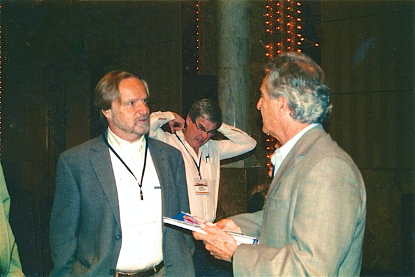
I was, you may remember, long ago invited to give a talk about animal abuse or animal trauma. I gave a speech, and John Briere was there. We were all sitting around and someone turned to him in my hearing. There must have been twelve of us. And they said, “John, what do you think of Jeff’s book, ‘Against Therapy’”? (Which by the way is a book about abuse. It talks about lots of cases of abuse, early on, in psychiatry and psychology. But at the end I decided that psychology was not taking this seriously, and therefore I was against it.) And John said, “It’s a piece of shit.” And I was so hurt and so dumbfounded, I attacked back; and today I wouldn’t. I’d say, “Gee, I’m sorry to hear you feel that way. I’m surprised because it has a lot to do with child abuse and so on.”
But at the time, I wasn’t married with an amazing and wonderful wife, an amazing pediatrician, who taught me to be calm and quiet and not get angry. I got very angry. And so, in a way, that stopped me from continuing in the field. I thought, this is not for me, and I turned completely to animals. I love them.
Warwick Middleton: How do you compare relating to animals to humans, Jeff?
Jeffrey Masson: I do believe that the major difference is that animals, in terms of emotional honesty are better than humans, because they probably don’t have an unconscious. … Dogs don’t repress their feelings. That’s why I called my book, “Dogs Never Lie About Love”. They don’t have to lie about love. They love unconditionally.
I began to wonder, is it possible that some animals have more profound feelings than humans do – elephants in mourning, cats in contentment, dogs in love? I still believe that one day we’ll be able to learn a lot more about human emotions by studying animal emotion. It’s just the beginning. I wrote one of the first books about that called “When Elephants Weep: The Emotional Lives of Animals”. But now that’s a huge topic and everybody’s writing about it. Profound books are being written now about animal emotions. I think that’s a big, big advance. And as we’re talking, I’m looking at my rainbow lorikeets who are sitting on my balcony waiting for me to come and feed them…
Warwick Middleton: … I guess the arrow of history is somewhat on the side of the progressive. It’s two steps forward and one back but, progressively now our society is recognizing the full extent of abuse …
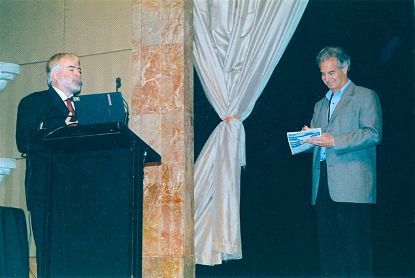
Jeffrey Masson: Oh! Absolutely. You’re one of the people that’s making that possible. I think also the information coming out about abuse in the Catholic Church has made that possible…there’s been so much abuse, it can’t be denied; and nobody’s trying to deny it. Nobody’s saying all these children are making it up…
Warwick Middleton: There’s no “Church fantasy syndrome”.
Jeffrey Masson: No, absolutely not. That’s very important. Of course, we see it now, in the case of Jeffrey Epstein, and all of these other cases (Weinstein et al.) and the President of the United States, God help us… All of this is coming to the front now, and it’s very important. It’s taking centre-place in the world of thought, and I think this is wonderful
This concludes our two part interview with Jeff. If you did not read part one see here.
Jeff’s ground-breaking book The Assault on Truth is still available on Amazon. We highly recommend reading this valuable part of our history. (Remember to use your Amazon Smiles to raise money for ISSTD).
Paper copies are getting hard to find, but are still around here.
The Kindle edition is available here.

